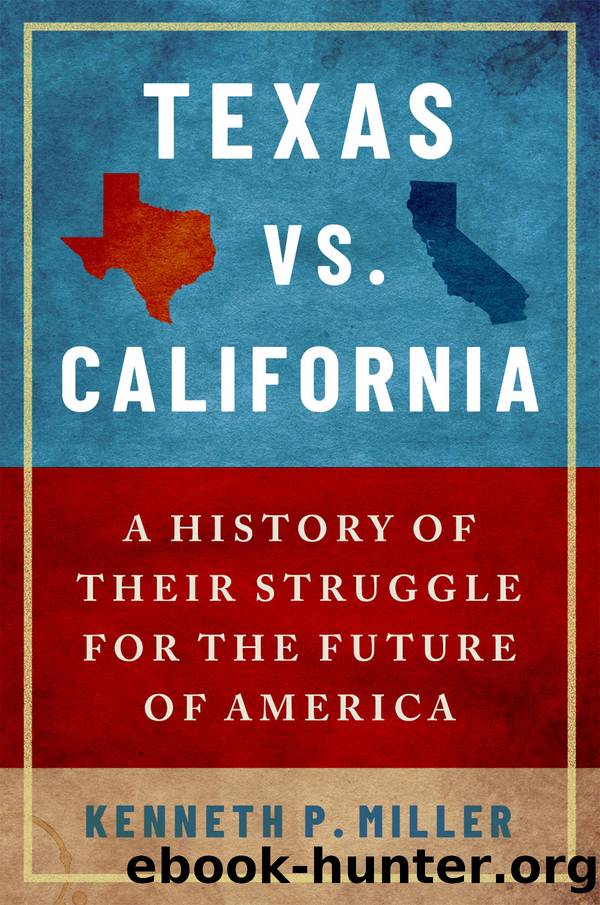Texas vs. California by Kenneth P. Miller

Author:Kenneth P. Miller
Language: eng
Format: epub
Publisher: Oxford University Press
Published: 2020-01-15T00:00:00+00:00
Struggle for the Nationâs Energy Future
The rivals have developed radically different visions of the nationâs energy future.
Texas has sought to maximize production of all energy resources and plans to continue developing fossil fuel resources for years to come. It has been especially keen to exploit the bounty of the shale revolution. Texans have taken pride in helping the United States achieve energy independence and have argued that plentiful, cheap energy promotes economic prosperity for the state, the nation, and, indeed, the entire world. By any account, the Lone Star Stateâs high-level energy production and comparatively low energy costs have contributed to its remarkable economic growth. In Texasâs view, the progressive project to decarbonize the economy is unrealistic and dangerous. The state fears that aggressive regulatory agendas such as Californiaâs climate policies or the Green New Deal would impose heavy costs on industry and consumers and, more, would place environmental regulators in charge of nearly every area of economic life. Many Texans remain unconvinced that climate challenge poses the type of urgent, existential threat that warrants high economic costs and unprecedented levels of government intervention and control. It rejects what it considers heavy-handed federal environmental rules or, worse, standards devised by regulators in California. In the face of criticism that its embrace of carbon fuels is endangering the planet, Texas points to its leadership in renewable energy and argues that the problem of climate change can be managed through market forces, new innovative technologies, and sustainable environmental improvements. In the stateâs view, climate policies are acceptable only if they respect business, keep costs low, and maintain individual freedom. Texas is confident that the nationâs long term energy demands will allow the state to sustain its fossil fuel industry for years to come, even in the face of growing climate activism in other parts of the nation and around the world.
California, by contrast, is more fully convinced that climate change presents an existential threat, and, consistent with its progressive political orientation, has empowered government regulators to fight that threat. The Golden State has been willing to reinvent its economy to run on new energy sources, even if that transition imposes higher costs on businesses and consumers. As California has adopted a growing body of environmental regulations, its residents have been forced to pay higher prices for gasoline, electricity, new home construction, and more. Although policymakers have insisted that businesses and consumers will realize long-term savings by converting to more fuel-efficient alternatives, the short-term costs are substantial and have contributed to the stateâs widening economic divide. Wealthy Californians have found it easier than struggling middle-class and poor residents to absorb the costs of living in an environmentally friendly state. California has bet that its climate policies will not overly burden its economy, and indeed that its climate strategy will produce long-term economic prosperity. In this view, Californiaâs early commitment to developing a green economy will allow it to pay lower compliance costs in the future as other states struggle to catch up. Moreover,
Download
This site does not store any files on its server. We only index and link to content provided by other sites. Please contact the content providers to delete copyright contents if any and email us, we'll remove relevant links or contents immediately.
| Africa | Americas |
| Arctic & Antarctica | Asia |
| Australia & Oceania | Europe |
| Middle East | Russia |
| United States | World |
| Ancient Civilizations | Military |
| Historical Study & Educational Resources |
Machine Learning at Scale with H2O by Gregory Keys | David Whiting(4313)
Never by Ken Follett(3957)
Fairy Tale by Stephen King(3399)
Oathbringer (The Stormlight Archive, Book 3) by Brandon Sanderson(3216)
The Man Who Died Twice by Richard Osman(3080)
Will by Will Smith(2920)
Rationality by Steven Pinker(2366)
Can't Hurt Me: Master Your Mind and Defy the Odds - Clean Edition by David Goggins(2342)
The Dark Hours by Michael Connelly(2311)
Friends, Lovers, and the Big Terrible Thing by Matthew Perry(2230)
The Dawn of Everything: A New History of Humanity by David Graeber & David Wengrow(2210)
Principles for Dealing With the Changing World Order: Why Nations Succeed and Fail by Ray Dalio(2055)
A Short History of War by Jeremy Black(1848)
HBR's 10 Must Reads 2022 by Harvard Business Review(1845)
Go Tell the Bees That I Am Gone by Diana Gabaldon(1758)
A Game of Thrones (The Illustrated Edition) by George R. R. Martin(1746)
Kingdom of Ash by Maas Sarah J(1683)
515945210 by Unknown(1667)
443319537 by Unknown(1560)
